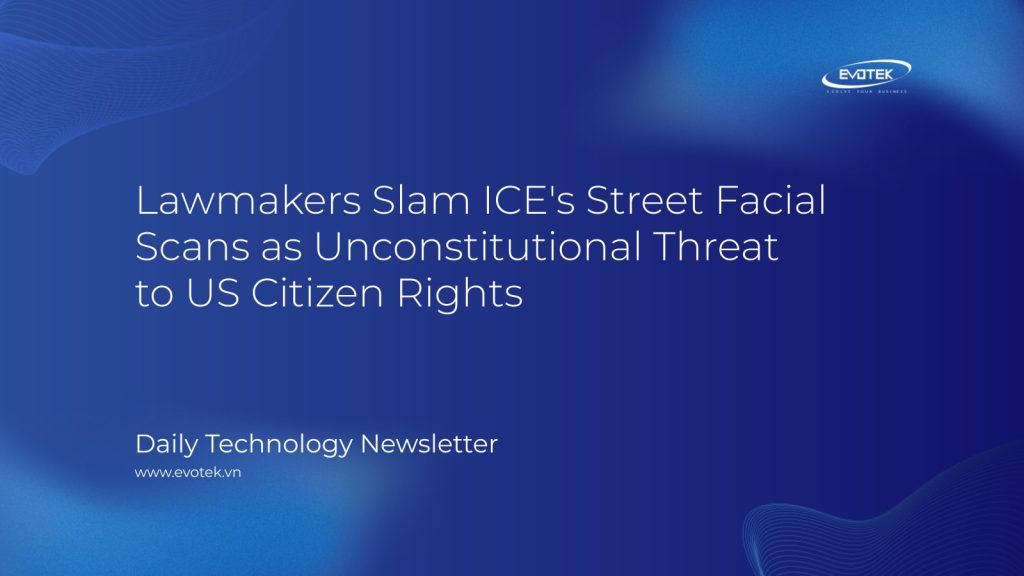Recent reports and social media videos confirm that officers from U.S. Immigration and Customs Enforcement (ICE) and Customs and Border Protection (CBP) are actively deploying facial recognition technology on American streets to verify citizenship, raising serious constitutional questions and drawing sharp criticism from lawmakers.
One striking instance, highlighted in a Chicago-based Instagram video, shows a self-identified U.S. citizen teenager without government identification being subjected to a facial scan. Despite offering a student ID, an officer asked a colleague, “can you do facial?” and proceeded to scan the minor’s face using an app. The officer reportedly told the teen to “relax,” suggesting that “a lot of parents” falsely claim their children were born in the U.S. The interaction concluded with the officer taking the teen’s photo and asking for name verification against the app’s database.
Mobile Fortify: A Controversial Biometric Tool
While the specific app used in the Chicago incident remains unconfirmed, 404 Media has extensively documented ICE and CBP’s expanding use of facial recognition, particularly amidst mass deportation campaigns criticized for racial profiling. Earlier this year, leaked emails revealed ICE’s use of an application called Mobile Fortify. This technology reportedly accesses “an unprecedented number of government databases” to cross-reference face matches against a massive database containing 200 million images.
According to 404 Media, a single photo scan with Mobile Fortify can yield a subject’s name, date of birth, alien number, and even deportation order status. This powerful tool is just one component of ICE’s biometric arsenal, raising concerns about its reach and impact.
Congressional Pushback on Unconstitutional Practices
In response to these concerning developments, Senator Bernie Sanders and seven other Democratic senators issued a letter in September, urging ICE to discontinue the use of Mobile Fortify and similar biometric technologies. They argue that these tools are “often biased and inaccurate, especially for communities of color,” and are “likely to be disproportionately weaponized against communities of color,” fostering environments ripe for racial profiling.
The senators’ letter cited a case where an American citizen was “wrongfully detained” for 30 hours based on an incorrect biometric identity confirmation, deeming ICE’s reliance on face scans “unacceptable.” They highlighted a 2024 National Institute of Standards and Technology test which found facial recognition less accurate with low-quality, blurry, obscured, or poorly lit images—precisely the conditions common during street-level smartphone scans.
The lawmakers warned that continued expansion of such tools would “almost certainly proliferate” errors, and even if perfectly accurate, these technologies would still pose significant threats to individual privacy and free speech.
Civil Liberties at Risk
Matthew Guariglia, a senior policy analyst at the Electronic Frontier Foundation, told 404 Media that ICE’s increasing use of facial recognition underscores the urgent need to ban government deployment of this technology. He called it “dangerous, invasive, and an inherent threat to civil liberties,” suggesting it dispels any “pretense that ICE is harassing and surveilling people in any kind of ‘precise’ way.”
Unanswered Questions and Forced Compliance
The senators’ letter to ICE acting director Todd Lyons raised a series of critical questions regarding the agency’s “expanded use of biometric technology systems,” which they believe carries “a sweeping and lasting impact on the public’s civil rights and liberties.” They sought clarification on when ICE began domestic deployments of face scans, which were previously understood to be limited to border areas, and details on the testing conducted for accuracy and bias in apps like Mobile Fortify. Crucially, they asked about policies concerning Mobile Fortify’s use to identify U.S. citizens.
Despite an October 2 deadline for a response, Ars Technica confirmed that ICE failed to provide answers. While the Department of Homeland Security (DHS) declined to “confirm or deny law enforcement capabilities or methods,” CBP did confirm Mobile Fortify’s continued use by ICE, alongside “a variety of technological capabilities” intended to enhance agent effectiveness.
For individuals identifying as U.S. citizens during these encounters, opting out of face scans appears to be rarely an option, even when identification is provided. Another video cited by 404 Media depicts a man, who claims to have already shown his ID and declared himself an American citizen, being instructed to remove his hat for a scan. An agent dismissively tells him, “This is not a big deal,” and “Relax,” despite the man repeatedly stating he was on his way to work.
Potential for Misuse and Unconstitutionality
Democrats contend that these practices are indeed a “big deal.” Past audits concerning citizen privacy had led to restrictions on ICE’s facial recognition tools, including limiting their use during live body-cam recordings. There are concerns that Mobile Fortify intends to integrate commercial data soon, potentially drawing more U.S. citizens into its database without clear guidelines on data retention or safeguarding.
Under the E-Government Act, ICE is required to conduct a privacy threshold analysis or privacy impact assessment for Mobile Fortify’s deployment. However, Ranking Member of the House Homeland Security Committee Bennie G. Thompson (D.-Miss.) told 404 Media that Mobile Fortify appears to lack adequate testing, jeopardizing Americans’ rights, even those with proof of citizenship.
Thompson starkly stated, “Mobile Fortify is a dangerous tool in the hands of ICE, and it puts American citizens at risk of detention and even deportation.” He revealed that ICE officials consider an apparent biometric match from the app a “definitive” status determination, allowing officers to “ignore evidence of American citizenship—including a birth certificate—if the app says the person is an alien.” Thompson condemned this as a “frightening, repugnant, and unconstitutional attack on Americans’ rights and freedoms,” given ICE’s use of the app beyond its developers’ original intent or testing.

 日本語
日本語 한국어
한국어 Tiếng Việt
Tiếng Việt 简体中文
简体中文